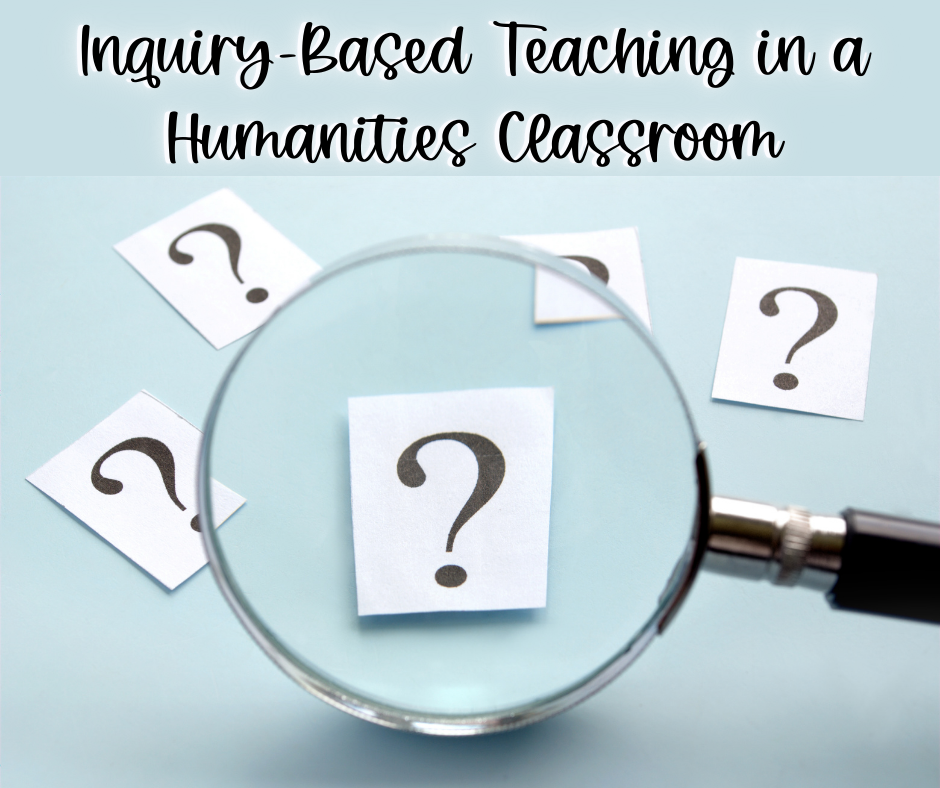Inquiry-based teaching is something that I always associated with science. When I was earning my undergrad degree, I was a middle grades education major with concentrations in science and English language arts, so half of my classes were science-based while the others were in the humanities. The instructional classes taught two very different approaches: science was inquiry-based, and English wasn’t. Now, however, after twelve years of teaching, I’ve figured out that inquiry isn’t mutually exclusive with science. In fact, I might argue that inquiry-based teaching can be more powerful in an English classroom than a science one!
Let’s back up though… what exactly IS inquiry-based teaching? Simply put, inquiry-based teaching is when your instructional choices and student investigations are driven by a central, open-ended, well-crafted essential question. In a science classroom, the students are given the question and then the teacher’s instruction gives them the knowledge and skills to design and execute an experiment that investigates the question in the hopes of allowing the students to draw conclusions and eventually answer the question. Ideally, there is no right or wrong answer to the question, but in science, that can be hard to do.
In an English or Social Studies classroom, however, open questions are much easier to come by. It usually asks about some larger moral issue that truly doesn’t have a “right” answer, so students have to decide their own opinion and then defend it based on their background knowledge and readings from the class.
The essential question is the key. If done properly, it will be ultra thought-provoking and will motivate the students to devote a lot of deep thought into crafting their answer. For example, one of the questions I’ve used was “At its core, is human nature more civilized or savage?” Everyone can have their own opinion, but there is no single right answer. The main text that we studied was Lord of the Flies, and we tracked each character’s placement on a civilized/savage continuum. We also studied several other supporting texts with a similar theme, and then at the end, the students wrote an argumentative essay answering the essential question with evidentiary support from the texts we studied.
The discussions that came out of this unit were outstanding! Students were debating, pulling examples from texts, drawing on their own experiences, and absolutely blowing my mind with their depth of thought. This was possible because every instructional decision was driven by that essential question, and everything we did in class pointed back to it. Every time we read a new text or had a class discussion of any kind, we would revisit the essential question and examine it through that lens. By the time we were done with the unit, the students were more than prepared to share their opinions, and could support their arguments with expert level evidence and explanation. This is also a great time to host a socratic seminar!
It was a beautiful process to witness.
Drafting a quality essential question is paramount to making this work, but it is often the hardest part. If you try to execute an inquiry-based unit with a poorly written essential question, the discussions will be shallow and the unit will lack drive. Students will lose interest and will have a really hard time answering the question at the end.
When writing an essential question, ask yourself the following questions:
- Does the essential question have a finite amount of possible answers? If so, the question may be too simple or straight-forward. Make sure that it’s more than a simple either/or. In the example above with savagery vs. humanity, there are only two possible answers, but within that there is also a spectrum on which one may fall. It’s a complicated enough issue to make it a quality essential question.
- Does the essential question address some sort of larger life issue that students need to examine? If not, you may want to broaden the scope. This gives students more to sink their claws into as they explore the question. It also produces more buy-in because they know the question actually matters in real life.
If you are still struggling with writing an essential question, reach out to other teachers for help workshopping it. Odds are, there is someone in your building that is already playing around with inquiry-based teaching and who would love to work with you! Still having trouble? The good news is that we live in the age of the internet, and our connectivity potential is endless. The best person I can think of for workshopping essential questions is Amanda Cardenas with Mud and Ink Teaching. Her handle on instagram is @mudandinkteaching. You can send her a dm on instagram, and she’s usually more than happy to help fellow teachers. Amanda is also one half of the outstanding duo teacher team at Brave New Teaching. They are a podcast team, but they also have phenomenal resources and workshops. They have several podcast episodes dedicated to essential questions and inquiry-based teaching.
And of course, you can ALWAYS reach out to me via email at [email protected]. Nothing would give me more pleasure than to help you workshop your essential questions! I am also on facebook and instagram @trickedoutteaching. Everyone CAN teach this way! It just takes practice and a good support team!
Comment below and share your experiences with inquiry-based teaching!
If you like this post, you should also check out my other blog posts at trickedoutteaching.com, and join my mailing list here to never miss a new post!
Please also check out my Teachers Pay Teachers store for more free and inexpensive resources!

